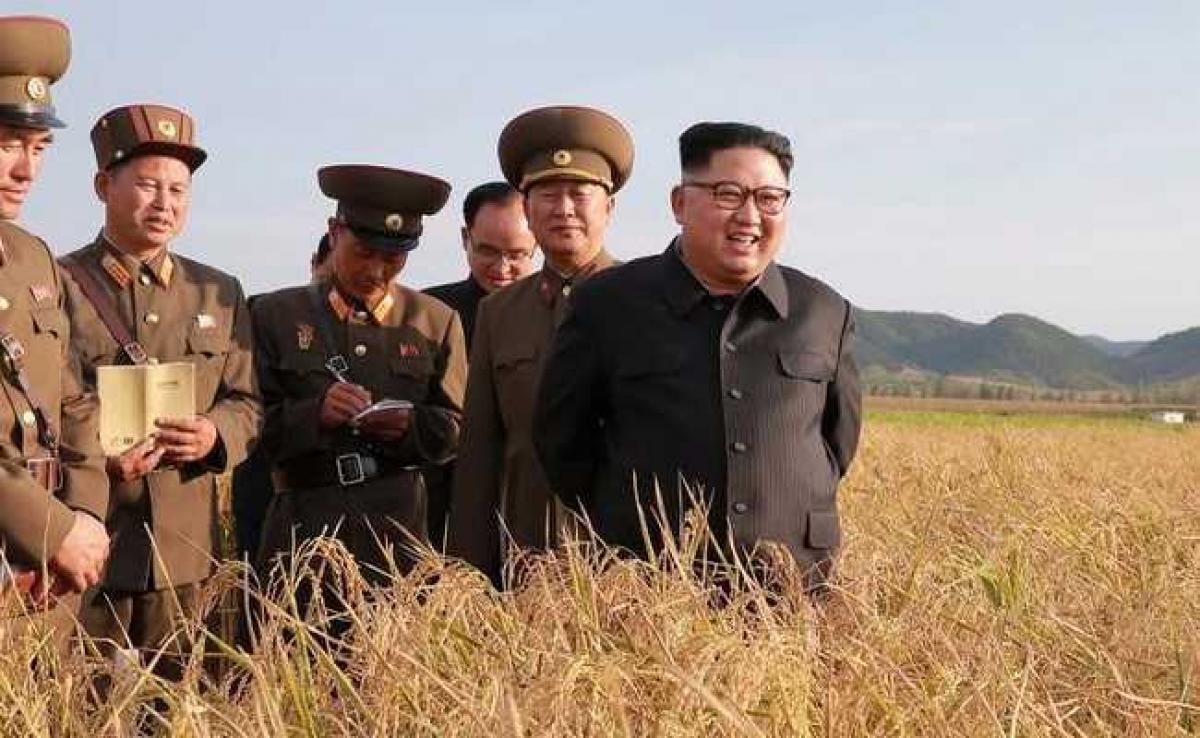Live
- 3-language policy in NEP is good for country: Rijiju
- Cadaver dogs on hunt to detect trapped humans
- PM Modi’s approval ratings remain strong
- Modi highlights India’s thriving space startups
- MLC polls verdict: Educated, youths inclined toward BJP
- Kritika Kamra: Never compromised my ethics to make it big
- BJP Cadre Celebrate Anji Reddy’s MLC Victory in Villages, Confident of Party’s Rise in Telangana
- BJP Celebrates MLC Election Victory in Aija, Predicts Winning Streak in Telangana
- Collector Urges Artisans to Benefit from PM Vishwakarma Yojana for Economic Growth
- Irregularities in MGNREGA Funds Spark Legal Concerns in Aiza Block
Just In

North Korea\'s nuclear antics have rattled its alliance with China to the point that Beijing is allowing the previously unthinkable to be discussed: Is it time to prepare for the renegade regime\'s collapse?
North Korea's nuclear antics have rattled its alliance with China to the point that Beijing is allowing the previously unthinkable to be discussed: Is it time to prepare for the renegade regime's collapse?
While China's official goal is to bring Washington and Pyongyang to the negotiating table, it is also permitting once taboo debate on contingencies in case war breaks out in the isolated nation across its northeast border.
Observers say the public debate might be a tactic to try and coerce Pyongyang into cooling its weapons programme, with its nuclear and missile tests visibly angering Beijing, which has backed tough new United Nations sanctions on the country.
But it may also indicate growing calls to overhaul its relationship with the North, a longterm ally that it defended during the 1950-53 Korean War and has a mutual defence pact with.
Jia Qingguo, dean of the School of International Studies at Peking University, raised eyebrows earlier in September when he published an article entitled: "Time to prepare for the worst in North Korea".
The paper was published in English in East Asia Forum, a website of the Australian National University, but it is unlikely that he could have released it without the approval of Chinese authorities.
Jia urged Beijing to start discussing contingency plans with the United States and South Korea -- talks that the two nations have sought in the past but China has resisted for fear of upsetting Pyongyang.
"When war becomes a real possibility, China must be prepared. And, with this in mind, China must be more willing to consider talks with concerned countries on contingency plans," Jia wrote.
Beijing, he said, could discuss who would control North Korea's nuclear arsenal -- either the United States or China.
To prevent a massive flow of refugees across the border, China could send its army to North Korea to create a "safety zone", Jia said.
Another touchy issue would be who would "restore domestic order in North Korea in the event of a crisis". China, he said, would object to letting US soldiers cross the 38th parallel into North Korea.
An August editorial in state-run nationalist tabloid Global Times said China should remain neutral if North Korea launches missiles against the US and Washington retaliated, and only intervene if the US and South Korea tried to overthrow the Pyongyang regime.
'Better without them'
Discussions about the end of the North's regime could be aimed at scaring Kim Jong-Un and pleasing Trump before the US leader's trip to Beijing in November, a Western diplomat said.
US Secretary of State Rex Tillerson met President Xi Jinping and top Chinese diplomats in Beijing on Saturday to discuss the North Korean nuclear crisis.
"If the international community can unite and pretend there's going to be a real war, there is a chance that North Korea will freeze its nuclear tests," Wang Peng, research fellow at Fudan University in Shanghai, told AFP.
But there are also signs of a genuine shift in perceptions over how China should handle North Korea.
David Kelly, director of research at Beijing-based consultancy China Policy, said the thinking among Chinese academics was: "We could do better without them, a unified Korea would be incredibly good for China, the northeast would boom".
China has long supported North Korea because it serves as a buffer from US troops stationed in South Korea, but Barthelemy Courmont, a China specialist at the Institute of Strategic and International Relations in Paris, said Pyongyang's downfall could be good for Beijing, especially economically.
"China now believes that a collapse of North Korea would not necessarily be to its disadvantage," Courmont said.
"If North Korea were to fall in a peaceful way, China would be best positioned for its reconstruction. China is the only country capable of overseeing the reconstruction of North Korea," he said.
Not so simple
Such talk was not always permitted.
Deng Yuwen was suspended from his job as editor of the journal of the Communist Party's Central Party School in 2013 after writing an article saying China should abandon North Korea.
But this year he wrote unimpeded about post-conflict planning.
"If the two Koreas reunified, there would no longer be the needs for the presence of US troops in South Korea and the South Korean people would not let them stay," Deng said in April in an article published by the Charhar Institute think tank.
Moreover, he said, South Korea would no longer need to host the US THAAD missile defence system.
Its deployment has infuriated Beijing because it fears that its powerful radars could peer deep into China and destabilise the region.
But dropping Pyongyang is not that simple, Kelly said.
"The problem is: how do you cut the cord, because nobody knows what North Korea will do," he said.

© 2025 Hyderabad Media House Limited/The Hans India. All rights reserved. Powered by hocalwire.com







